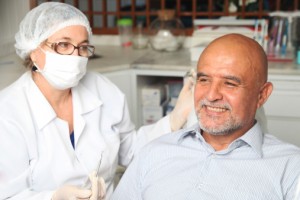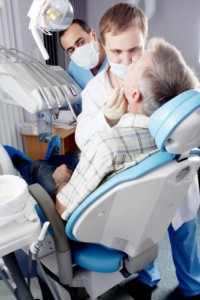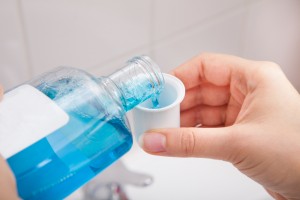What to Expect During Your First Dental Visit
December 15, 2014
 If it’s been a long while since you’ve visited the dentist, you might be apprehensive about making an appointment for a dental checkup. Dr. Banda wants to help you overcome your dental anxiety so that you can get the preventive dental care you need. To help do this, we have outlined what you can expect during your first dental visit at Cranbrook Dental Care. You can make an appointment with Dr. Banda today for your next dental check up. Cranbrook Dental Care helps families stay healthy throughout metro Detroit including, Troy, Bloomfield Hills, Clarkston, Royal Oaks and Birmingham.
If it’s been a long while since you’ve visited the dentist, you might be apprehensive about making an appointment for a dental checkup. Dr. Banda wants to help you overcome your dental anxiety so that you can get the preventive dental care you need. To help do this, we have outlined what you can expect during your first dental visit at Cranbrook Dental Care. You can make an appointment with Dr. Banda today for your next dental check up. Cranbrook Dental Care helps families stay healthy throughout metro Detroit including, Troy, Bloomfield Hills, Clarkston, Royal Oaks and Birmingham.
Your First Dental Visit May Include:
- Tooth-by-tooth Exam
o Evaluate your risk of tooth decay, root decay, and gum or bone disease
o Evaluate your need for tooth restoration or tooth replacement
o Check your bite and jaw for problems
o Remove any stains or deposits on your teeth
- Digital X-rays
o Less radiation
o High quality images
- Oral Cancer Screening
o Check for red or white patches or mouth sores
o Check the tissues in your mouth for lumps or other abnormalities
- Periodontal Analysis
o Pocket depth
o Bleeding points
o Gum recession
o Furcation involvement
o Mobility
- Bite Assessment
o Check for excessive tooth wear, tooth breakage, tooth sensitivity, jaw joint pain, and joint noises
Your First Dental Visit in Bloomfield Hills, MI
The information gathered during your first dental visit will serve as the basis for the treatment your dentist recommends. Remember that regular dental examinations are essential to maintain good oral health and protect your overall health. Don’t delay the dental care you need any longer. Make an appointment with Dr. Banda today for your routine dental checkup. The experienced and compassionate dentists of Cranbrook Dental Care proudly restore smiles throughout metro Detroit including, Troy, Bloomfield Hills, Clarkston, Royal Oaks and Birmingham.
How Much Do You Know About Oral Cancer?
November 15, 2014
 Unlike other cancers, oral cancer can easily go undetected if you don’t visit the dentist for a regular check-up. An early oral cancer diagnoses could save your life. Make an appointment with Dr. Banda today for your oral cancer screening. The experienced dentists of Cranbrook Dental Care use Vizilite, the leading oral cancer screening system, to check for early signs of oral cancer. Cranbrook Dental Care proudly serves families throughout metro Detroit including, Troy, Bloomfield Hills, Clarkston, Royal Oaks and Birmingham.
Unlike other cancers, oral cancer can easily go undetected if you don’t visit the dentist for a regular check-up. An early oral cancer diagnoses could save your life. Make an appointment with Dr. Banda today for your oral cancer screening. The experienced dentists of Cranbrook Dental Care use Vizilite, the leading oral cancer screening system, to check for early signs of oral cancer. Cranbrook Dental Care proudly serves families throughout metro Detroit including, Troy, Bloomfield Hills, Clarkston, Royal Oaks and Birmingham.
Oral Cancer Symptoms
- Mouth sore that lasts longer than two weeks (most common symptom)
- Persistent mouth pain
- Lump in the cheek
- White or red patch on the gums, tongue, tonsil, or lining of the mouth
- Sore throat or constant feeling that something is caught in the throat
- Difficulty swallowing or chewing
- Difficulty moving the jaw or tongue
- Numbness anywhere in the mouth
- Jaw swelling
- Loose teeth
- Severe toothaches
- Voice change
- Lump in the neck
- Rapid unexplained weight loss
- Halitosis
Oral Cancer Risk Factors
- Tobacco and Alcohol– Including cigarette smoking, heavy alcohol use, or the use of both tobacco and alcohol together. Using tobacco plus alcohol poses a much greater risk than using either substance alone.
- HPV Infection – The sexually transmitted human papillomavirus (specifically the HPV 16 type) has been linked to a subset of oral cancers.
- Age– Risk increases with age. Especially people over 40.
- Prolonged Sun Exposure– Cancer of the lip can be caused by sun exposure.
- Diet– A diet low in fruits and vegetables may also play a role in oral cancer development.
Oral Cancer Screening in Bloomfield Hills, MI
Regular dental visits are not only essential to maintaining good oral health they can literally save your life. Don’t take a chance with your health; make an appointment with Dr. Banda and the experienced dentists of Cranbrook Dental Care to get the oral cancer screening you need. Cranbrook Dental Care proudly serves families throughout metro Detroit including, Troy, Bloomfield Hills, Clarkston, Royal Oaks and Birmingham.
Does your dentist use Intraoral Cameras?
October 15, 2014
 When you think of going to the dentist, one image you might imagine is the dental x-ray. X-rays allow dentists to find cavities, check the health of a tooth’s root and the bone surrounding the tooth, check on developing teeth and monitor the health of your teeth and jawbone. However, when your dentist detects a problem such as a cavity, or other tooth decay, it’s hard to relate that issue clearly to the patient using just the x-ray image. What appears to be a tiny dark blemish in an x-ray image might de-emphasize the magnitude of a particular dental problem. If your dentist doesn’t use the latest technology to diagnose your symptoms, it’s time to make an appointment with Dr. Banda. The experienced dentists of Cranbrook Dental Care use intraoral cameras to diagnose and treat the patients of Cranbrook Dental Care. Call Dr. Banda today to set up your next appointment. Cranbrook Dental Care proudly serves families throughout metro Detroit including, Troy, Bloomfield Hills, Clarkston, Royal Oaks and Birmingham.
When you think of going to the dentist, one image you might imagine is the dental x-ray. X-rays allow dentists to find cavities, check the health of a tooth’s root and the bone surrounding the tooth, check on developing teeth and monitor the health of your teeth and jawbone. However, when your dentist detects a problem such as a cavity, or other tooth decay, it’s hard to relate that issue clearly to the patient using just the x-ray image. What appears to be a tiny dark blemish in an x-ray image might de-emphasize the magnitude of a particular dental problem. If your dentist doesn’t use the latest technology to diagnose your symptoms, it’s time to make an appointment with Dr. Banda. The experienced dentists of Cranbrook Dental Care use intraoral cameras to diagnose and treat the patients of Cranbrook Dental Care. Call Dr. Banda today to set up your next appointment. Cranbrook Dental Care proudly serves families throughout metro Detroit including, Troy, Bloomfield Hills, Clarkston, Royal Oaks and Birmingham.
The Benefits of Intraoral Cameras
Intraoral cameras are small camera devices, no larger than a dental mirror, with a disposable cover and an attached LED light, that can take both digital still photos and video of the inside of your mouth. These images can be shown on a video monitor inside the treatment room during your visit. If the dentist does detect an issue inside your mouth, they can show you the affected area with an image that can be magnified up to 40 times on a video monitor. As a diagnostic tool, the intraoral camera can be used to find and document dental problems from every angle and in between your teeth. You can see issues involving discoloration of the gums, gum disease, cracked teeth and broken fillings, plaque deposits and cavities next to fillings.
Treatment Using Intraoral Cameras in Metro Detroit
The use of the intraoral camera is beneficial for both you and your dentist. As an educational tool, you become a part of the examination process and can be better informed about your treatment options. Your dentist can keep better documentation for your future care with a tool that gives them better visibility during treatment and image power that rivals a microscope. Most importantly, intraoral cameras aid in the early detection of dental problems. Contact Dr. Banda and the qualified dentists at Cranbrook Dental Care today to set up your next appointment. Cranbrook Dental Care proudly serves patients throughout metro Detroit including, Troy, Bloomfield Hills, Clarkston, Royal Oaks and Birmingham.
Best Time in History to See The Dentist
September 15, 2014
 Many Americans have fears associated with going to the dentist to some degree. Some of those fears are caused by bad experiences from our childhoods, hearing about the bad experiences of others, or perhaps just a dislike of the idea of dental work in general.
Many Americans have fears associated with going to the dentist to some degree. Some of those fears are caused by bad experiences from our childhoods, hearing about the bad experiences of others, or perhaps just a dislike of the idea of dental work in general.
But when it comes to the health of your teeth and the availability of quality dental care, there is no better time than the present to visit Dr. Banda at Cranbrook Dental Care in metro Detroit, MI. Ever wonder what people did to treat tooth pain and decay before the advancements in modern dentistry we enjoy today?
Interesting Facts about Dental History
The origins of modern dentistry can be traced all the way back to the Romans and Egyptians. However, the causes of both tooth pain and decay were not known back then. Nor was the importance of oral hygiene and maintenance. Without this basic understanding, the ancients attributed dental problems to demons and evil spirits. Many even believed that holes in teeth were caused by tooth worms.
Our ancestors were just as creative in seeking remedies to tooth problems, including using arsenic and fumigants. The Romans were fond of using urine (for the ammonia) to clean their teeth, while the Egyptians used opium to treat pain. There were also advocates for using wine and vinegar as mouthwash, or brushing your teeth using the twig of a fig tree and a honey and oil paste.
While there is evidence of crude dental tools as early as 7000 B.C, the first record of modern dental procedures didn’t emerge until the middle ages. Some books from this period have written instructions on tooth extraction. Back then, dental procedures were performed by barbers. The same barbers that shaved beards and trimmed hair would also perform surgical procedures such as bleeding, cupping, leeching, and extracting teeth.
Modern Dentistry
It wasn’t until the early 18th century that modern dentistry began to take shape. In 1723 Pierre Fauchard, a French surgeon, published The Surgeon Dentist, A Treatise on Teeth. In the 1800’s the first dental chair, porcelain teeth, orthodontics, ether anesthesia and dental college emerged.
In 1938, the modern toothbrush was invented. In 1950, fluoride toothpaste came to market. The 1980’s brought about the use of dental implants and home teeth whitening. Cosmetic dentistry has only become popular in the last 20 years.
A brief look into our history will show that we are very lucky to be living in the modern era of dentistry. Unlike our forefathers, we have immediate access to hygienic, pain free dental care. You can rest assured that this is the best time, in history, to see your dentist and be proactive about your overall oral health. Take advantage of this access and contact Dr. Banda at Cranbrook Dental Care today to set up your next appointment. We serve everyone throughout metro Detroit including, Troy, Bloomfield Hills, Clarkston, Royal Oaks and Birmingham.
Calm Your Fears with Sedation Dentistry
August 15, 2014
 Something that many people have in common is a fear. Whether it is a fear of snakes or flying, may people live with so many different fears, and it may affect the way they live their daily lives. For some the fear may be slight, but for others, it can be crippling. A fear that many people have in common is a fear of the dentist. Because of this fear, people may delay the much needed dental work they need performed, causing them to live their lives with a deteriorating mouth. Though you may feel as though there is nothing you can do to get over your fear, Dr. Banda is able to help. By offering sedation dentistry at his Bloomfield Hills, MI dental office, he is able to calm the fears of his patients with ease.
Something that many people have in common is a fear. Whether it is a fear of snakes or flying, may people live with so many different fears, and it may affect the way they live their daily lives. For some the fear may be slight, but for others, it can be crippling. A fear that many people have in common is a fear of the dentist. Because of this fear, people may delay the much needed dental work they need performed, causing them to live their lives with a deteriorating mouth. Though you may feel as though there is nothing you can do to get over your fear, Dr. Banda is able to help. By offering sedation dentistry at his Bloomfield Hills, MI dental office, he is able to calm the fears of his patients with ease.
Aside from our patients who have a fear of the dentist, sedation dentistry is also able to help those who suffer from TMJ and people who find it difficult to keep their mouths open for extended periods of time. One form of sedation we offer our patients is IV sedation. With this, we will sit down and talk to you, evaluating your anxiety level. This is a very personalized form of sedation, allowing us to administer just the right amount to ensure your absolute comfort. You will receive the sedation intravenously, and you will feel extreme relaxation and absolutely no pain during your dental work. Our doctors will be able to perform your dental work with ease while you sit and rest.
The other form of sedation we offer is oral conscious sedation. This involves taking a prescribed pill or drinking a liquid medication before your appointment. Again, you will be able to unwind while your dental work is being performed, and you will not feel any pain. With both forms of sedation, your vital signs, such as your breathing and heart rate, will be monitored, making sure everything is going smoothly. Another important thing to remember is that you will need a trusted loved one to bring you home after your dental appointment, as the effects of the sedation will still be in your system. If you would like to know more about sedation dentistry and how Dr. Banda can help, contact our office today!
Do you have questions about these services, or do you need to schedule an appointment with Dr. Banda or Dr. Steven Hane? Call us today! We are able to take care of all of your general, cosmetic, restorative, and sedation dentistry needs. We are proud to serve patients from across the Bloomfield Hills, MI area, including Royal Oak, Clarkston, Troy, and Birmingham. We look forward to treating you and giving you a beautiful, healthy smile!
Pediatric Sealants and Fluoride
July 2, 2014
 Until your child learns how to brush efficiently, he or she may be more prone to developing cavities. Thankfully, there are preventive services that can help young patients protect their teeth. And at Dr. Banda’s office in Bloomfield Hills, we’re happy to offer them at regular checkups and dental cleanings.
Until your child learns how to brush efficiently, he or she may be more prone to developing cavities. Thankfully, there are preventive services that can help young patients protect their teeth. And at Dr. Banda’s office in Bloomfield Hills, we’re happy to offer them at regular checkups and dental cleanings.
The specific services we’re talking about are dental sealants and fluoride treatments. And in today’s post, we want to talk briefly about what each one involves and how it helps.
Dental Sealants
Dental sealants protect the chewing surfaces of teeth, especially where there are deep pits or grooves where bacteria and food particles can hide. Sealants are applied as a liquid and then dried until they form a thin plastic layer directly protecting teeth from food or decay-causing bacteria. The entire process only takes about 10 to 45 minutes, depending on how many teeth we’ll be sealing. Once complete, results can last for as long as 10 years.
Fluoride Treatments
Fluoride helps teeth by attracting the minerals that strength tooth enamel. A fluoride treatment at our Bloomfield Hills office requires just one quick rinse. In addition to receiving fluoride treatments from us, make sure that your little one is also brushing with a fluoride toothpaste. What’s more, most water supplies in the US contain fluoride. Adding a fluoride mouthwash to your child’s regular brushing and flossing routine will also help your little one enjoy good oral health.
Do you have questions about these services, or do you need to schedule an appointment with Dr. Banda? Call us today. We serve patients from Clarkston, Troy, Royal Oak, Birmingham, and the entire metropolitan Detroit area.
Treating Bruxism with Customized Nightguards
June 19, 2014
 If you’ve never heard of bruxism, your immediate question might be, “What is bruxism?” In today’s post, we want to talk about what exactly this condition is, what causes it, and how Dr. Banda of Cranbrook Dental Care can help you treat it.
If you’ve never heard of bruxism, your immediate question might be, “What is bruxism?” In today’s post, we want to talk about what exactly this condition is, what causes it, and how Dr. Banda of Cranbrook Dental Care can help you treat it.
What Is Bruxism and What Causes It?
To put it simply, bruxism is a term that describes a recurring and unconscious struggle with teeth grinding. For many patients with bruxism, it’s caused by stress. What’s more, patients have the most trouble with it while sleeping, when it’s impossible to consciously stop grinding.
Symptoms of bruxism include headaches, earaches, and jaw pain. Other causes of bruxism, besides stress, include misaligned teeth, or a poor posture, poor diet, or poor sleep habits. Patients with bruxism may also display other kinds of biting habits. They may bite their fingernails, for instance, or they might bite the ends of pencils, their lips, or the insides of their cheeks. The condition affects roughly one-third of the population, and it’s more prevalent in women than men.
Over time, the constant pressure and motion associated with bruxism can seriously damage teeth. Bruxism can also contribute to TMJ dysfunction, which has many symptoms in common.
Customized Care for Teeth Grinding
Thankfully, treatment for teeth grinding is possible with a custom-made nightguard from Dr. Banda’s Bloomfield Hills dental office. During a consultation, we’ll evaluate your teeth, tissues, and muscles. Once we know what your needs are, Dr. Banda can help you understand how a nightguard will help you. We can also talk to you about other treatment techniques.
Do need help treating bruxism? Call Cranbrook Dental Care today for an appointment with Dr. Banda. We serve patients from Clarkston, Troy, Royal Oak, Birmingham, and the entire metropolitan Detroit area.
Are Your Brushing Correctly?
May 23, 2014
 Brushing and flossing are two of the most important daily activities you can do. With regular brushing and flossing, you can remove bacteria and plaque from your teeth and your gumline, protecting it from common oral health issues like tooth decay and gum disease. What’s more, because studies have linked gum disease with health problems in other parts of the body, caring for your smile is another way of caring for your overall health.
Brushing and flossing are two of the most important daily activities you can do. With regular brushing and flossing, you can remove bacteria and plaque from your teeth and your gumline, protecting it from common oral health issues like tooth decay and gum disease. What’s more, because studies have linked gum disease with health problems in other parts of the body, caring for your smile is another way of caring for your overall health.
So, now that you know how important brushing and flossing are, ask yourself: Are you brushing and flossing correctly?
To give your smile the help it needs, you should brush for about 120 seconds, or two minutes. You should also be sure that you’re dividing your time equally between not only your upper and lower teeth but also the inner surfaces and outer surfaces of your teeth. Hold your brush at about a 45 degree angle and apply gentle pressure as your scrub. To prevent bad breath, gently brush the surface of your tongue.
As for frequency, we recommend brushing at least twice a day, but it’s even better if you can do it after every meal. You should also floss at least once a day to get any leftover pieces of food away from your smile. And for extra protection from gum disease and tooth decay, we recommend using either an antibacterial or fluoride mouthwash.
Do you still have questions about how to brush and floss correctly? Don’t hesitate to call Dr. Banda’s office in Bloomfield Hills with your questions or to schedule an appointment. We serve patients from Clarkston, Troy, Royal Oak, Birmingham, and the entire metropolitan Detroit area.
Treating Sleep Apnea and Snoring with an Oral Appliance
April 24, 2014
 When you don’t get enough sleep at night, you can feel tired, stressed out, and moody the next day. If you feel this way often enough, you may see declines in your overall health and wellbeing.
When you don’t get enough sleep at night, you can feel tired, stressed out, and moody the next day. If you feel this way often enough, you may see declines in your overall health and wellbeing.
For some, there’s an easy fix to these symptoms. Maybe you just need to go bed earlier and at a more consistent time each night. In other cases, though, the fix may involve the diagnosis and treatment of a common but under-diagnosed condition known as sleep apnea.
Patients who struggle with sleep apnea stop breathing for 10 seconds or more throughout the night. As a result, the brain to send out a signal waking the patient up to take a breath.
Not every patient wakes up completely, though, which is why some patients don’t even know they are struggling with it. If you haven’t been diagnosed with sleep apnea but think you’re struggling with it, here’s a symptom to watch out for: snoring.
Often, the cause of a patient’s snoring and the cause of a patient’s sleep apnea go back to the same thing: obstruction from the tongue or lower jaw. Thankfully, there’s treatment for both at Dr. Banda’s office in Bloomfield Hills. A custom-made oral appliance from Cranbrook Dental Care will reposition your tongue and lower jaw while you sleep so that air passes through without anything stopping it. As a result, you can sleep better at night, and without snoring.
Are you worried that you might be struggling with sleep apnea? Call Cranbrook Dental Care in Bloomfield Hills to find out how Dr. Banda can help. We’re happy to offer care for sleep apnea and snoring to patients from Clarkston, Troy, Royal Oak, Birmingham, and the entire metropolitan Detroit area.
Athletic Mouthguards for Bloomfield Hills and Beyond
March 28, 2014
 Are you an athlete? Regardless of whether your play a contact sport or you enjoy something more solitary, you can benefit from wearing an athletic mouthguard. It’s been estimated that between 13 to 39 percent of all dental injuries have some connection to athletics.
Are you an athlete? Regardless of whether your play a contact sport or you enjoy something more solitary, you can benefit from wearing an athletic mouthguard. It’s been estimated that between 13 to 39 percent of all dental injuries have some connection to athletics.
You can prevent sports-related dental injuries by wearing an athletic mouthguard. That’s because quality mouthgaurds protect more than just your teeth. They also protect the tongue, lips, face, and jaw, and can even reduce the severity of concussion.
But not all athletic mouthguards are made equal. There are three different types.
Ready-made mouthguards are inexpensive and can be easily found in sporting goods stores. But while they provide some amount of protection, they aren’t customized. As a result, they can fit awkwardly and make breathing and speaking difficult.
Mouth-formed mouthguard provide more customized results. Also known as boil-and-bite mouthguards, this type conforms to your smile after being softened in hot water. But some feel that mouth-formed mouthguards have a bad taste. They can also lose their flexibility over time.
The best type of athletic mouthguard is one that’s been custom-made just for you. At Dr. Banda’s office in Bloomfield Hills, we can take impressions of your teeth and have a mouthguard made from them. With a custom-made mouthguard, you can play with more confidence and without worrying about your smile.
Do you want a custom-made athletic mouthguard? Call Cranbrook Dental Care for an appointment with Dr. Banda. We serve patients from Bloomfield Hills, Clarkston, Troy, Birmingham, Royal Oak, and beyond.










